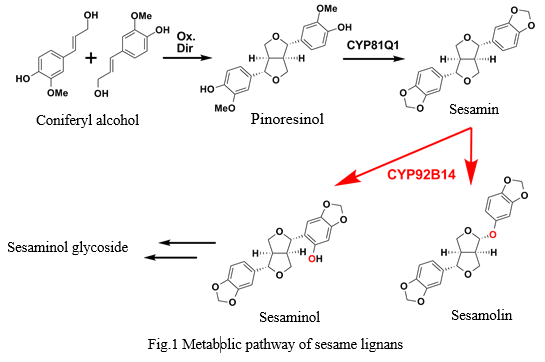News Release
(2017/12/20) - Suntory Foundation for Life Sciences
-

Suntory Foundation for Life Sciences
Discovery of a novel sesame enzyme that metabolizes sesamin valuable as a health-promoting compound
Published in Nature Communications, a general academic journal of natural sciences
Suntory Foundation for Life Sciences identified a gene for a novel enzyme CYP92B14 that metabolizes sesamin, one of the major substances called lignans that are rich in sesame seed oil, to produce two related lignans sesamolin and sesaminol (Fig. 1). The discovery of CYP92B14 fills the last piece in the biosynthetic pathway of major sesame lignans and provides insights into how sesame plants oxidize fairly inert sesamin. The study was a collaborative work with the University of Toyama, Suntory Global Innovation Center Limited, Ryukoku University and Kobe University, and was published in Nature Communications, a general academic journal of natural sciences, on December 18, 2017.
Published paper
“Oxidative rearrangement of (+)-sesamin by CYP92B14 co-generates twin dietary lignans in sesame”
Nature Communications 8:2155 (2017) DOI: 10.1038/s41467-017-02053-7
Jun Murata1†, Eiichiro Ono2†, Seigo Yoroizuka3†, Hiromi Toyonaga2, Akira Shiraishi1, Shoko Mori1, Masayuki Tera1, Toshiaki Azuma1, Atsushi Nagano4,5, Masaru Nakayasu6, Masaharu Mizutani6, Tatsuya Wakasugi3, Masayuki Yamamoto3*, Manabu Horikawa1*
1 Bioorganic Research Institute, Suntory Foundation for Life Sciences
2 Research Institute, Suntory Global Innovation Center Limited
3 Graduate School of Science and Engineering for Research, University of Toyama
4 Faculty of Agriculture, Ryukoku University
5 Japan Science and Technology Agency (JST) Strategic Basic Research Program (CREST)
6 Graduate School of Agricultural Science, Kobe University
†These authors contribute equally to the work, *Co-corresponding authors
Research Background
Sesame has long been cultivated for more than 4,000 years as a highly nutritious food and for many other applications.
Recent studies demonstrate that sesamin and its related compounds called lignans that are accumulated in sesame seed oil, exhibit antioxidative, antitumor, hepatoprotective and other health-promoting activities. Lignans are derived from phenylpropanoids that are found virtually in all the plants, and require enzymes specifically designed to biosynthesize and/or metabolize lignans. However, whether and how sesamin is oxidized to produce sesamolin and sesaminol remained elusive.
Research highlights
Through genetic analysis of the descendants between two sesame varieties, one that accumulates sesamolin and the other does not, we identified a novel gene, named CYP92B14, to be responsible for sesamolin biosynthesis. Biochemical evidences show that this enzyme catalyzes the oxidation of sesamin to yield sesamolin, and unexpectedly, sesaminol when expressed in yeast cells (Fig. 1).
 |
The use of sesamin that was labelled at specific positions with deuterium lead to the identification that CYP92B14 catalyzes a novel reaction mechanism that involves oxidative rearrangement of α-oxy-substituted aryl groups.
Significance of the research
Optimizing the expression and reaction properties of CYP92B14 could lead to efficient production of valuable lignans. Furthermore, the identification of a novel oxidation reaction by CYP92B14 might serve as a new tool for the conversion of chemical compounds that are otherwise difficult to oxidize.
●Suntory Foundation for Life Sciences
The foundation is a non-profit organization which was first established in 1946 as the Institute of Food Chemistry (1946-1979) by the second president of Suntory, Keizo Saji who wished to re-build the postwar Japan as a country contributing to global peace and prosperity through academic and cultural endeavors. The institute was renamed as the Suntory Institute for Bioorganic Research (1979-2011), and re-established as Suntory Foundation for Life Sciences in 2011. Throughout the history, we have been conducting basic life sciences research, with particular emphasis on bioorganic chemistry. Along with in-house research programs, we have been also serving future generation by offering a postdoctoral fellowship program as the first of its kind in Japan since 1980, research grants for early-career researchers as well as scholarships for graduate students.
